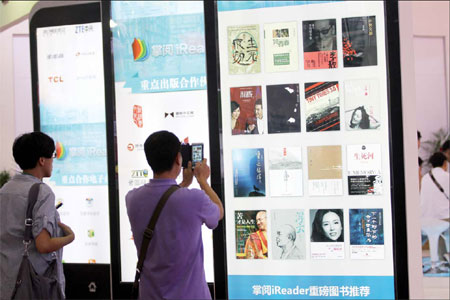The might of copyright
Updated: 2013-10-04 08:57
By Todd Balazovic and Chen Yingqun (China Daily)
|
|||||||||||
|
China's digital publishing market has grown bigger, but industry insiders say print will remain the primary form of literature in years to come. Zou Hong / China Daily |
"We're now thinking in terms of what we can learn from this market and export and what can we know from other markets and import," Entricken says.
Deals with local partners have proven lucrative for Wolters Kluwer, which says its revenue in the Chinese market grew 17 percent last year, not bad for an industry that is going through ructions.
Wolters Kluwer was one of the first Western publishers to set up shop in China, in 1985.
Helping the rapid trade of educational and reference material, the shift in focus from print to digital media has placed more emphasis on content and less on how it's delivered.
Over the past 10 years, Entricken says, the company has been transformed. The ratio of hard-copy books to digital content it published used to be 3 to 1, but today the figures are essentially reversed.
While China's publishing industry is still firmly wedded to hard-copy publishing, An Da, e-publishing director for Posts and Telecom Press, another of the country's publishing giants, says international pricing on digital books will change how information is exchanged.
"It's been very difficult for Chinese companies to sell books in Europe or the US because of high costs, trade policy and difficult after-sales service," he says.
"In addition, in the print market, Western groups have already taken a majority of the market share, so it's hard for Chinese publishers to compete. But in the digital area, the market is global and there's not much cost."
Digital content, particularly in the form of free self-published e-books sent chapter by chapter to mobile phones, has grown monumentally in China in the past five years or so.
The works are often of poor quality, but An says that if publishers can find a way to create demand from Chinese readers for paid high-quality content the business potential internationally is boundless.
Digital output also reduces publishers' overheads. The average price of an e-book is about 20 yuan, which is almost an international standard, so the cost of content is no longer an issue.
"It makes it easier for Chinese publishers to compete with content that Western publishers can't offer," An says.
Even as Chinese readers look for more foreign reading material, the copyright trade is going both ways, with interest in China in the West continuing to rise.
"At the beginning of China's reform and opening up, many Chinese wanted to read things about the Western world," says Tan of China Publishing Group.
"But with China's economic growth and cultural development, the world now wants to know about China."
In 2003, the number of titles of foreign books China imported was about 15 times what it sent to the world; last year the ratio was closer to 1.9 to 1.
Most books going overseas cover culture, education and tourism or are for children, says She Jiangtao, vice-president of Phoenix Publishing and Media, Inc.
Phoenix, which says it had a turnover of $1.08 billion last year, is the second-largest publishing house in China. It is one of a few publishers that have successfully marketed Chinese literature overseas.
"We began exporting books in 2006, but only started large scale after the 2009 Frankfurt Book Fair," She says, adding that China was the featured country of that year's fair.
Phoenix says it exports about 180 titles a year, and the number has grown by about 10 percent annually in recent years.
Though that is more than double what it was exporting four years ago, its revenue on those sales is paltry, just $100,000 (612,000 yuan), She says. That compares with revenue on digital sales of about 200 million yuan last year, which is just 8 percent of the company's total publishing revenue.
"In the future we'll invest more in exporting, but it still relies heavily on the quality of the products," She says.
"Now there are more channels, so it's not difficult to reach the global market. The biggest problem is content. Many Westerners are interested in China's economic, political and social situation, but they question the veracity of some books.
"So I hope Chinese books will be able to portray the real China."
Finding the right content for the right market is more important than price and medium when it comes to successfully moving into a new market. The trick to finding what diverse audiences want to read, whether in print or digital form, is trial and error, says Robert Fletcher, CEO of Publish on Demand Global.
"The answer is simply to keep trying. Bring as many books as possible and some will work."
Publish on Demand Global recently signed a 14-book deal with Anhui Press to translate and take the series to the US.
"Our job is to help Chinese translators publish their works," Fletcher says. "We can find translators and bring their works to English speakers as well as help them use digital technologies to bring Chinese writings to Chinese abroad.
"We see that as a market that is growing, especially as the Chinese mainland, Taiwan and Hong Kong begin to use digital technology to share intellectual property."
While a big question mark has hung over the publishing industry for at least 10 years as the digital market has become bigger, many Chinese publishers still believe print will remain the primary form of literature in years to come.
"Traditional publishing won't disappear," says Tan of China Publishing Group. "People aged over 50 still read books. For the next generation they will use the Internet for quick information or visual pleasure, but for thought-provoking material they will still turn to books.
"Just like our ancestors transferred content from bamboo slips to paper. The content is the same, but the carriers are different."
Contact the writers at toddbalazovic@chinadaily.com.cn and chenyingqun@chinadaily.com.cn
|
Left: Kevin Entricken, chief financial officer of the Dutch information company Wolters Kluwer. Right: Tan Yue, president of China Publishing Group Corp. Todd Balazovic / China Daily, provided to China Daily |
( China Daily European Weekly 10/04/2013 page1)
Related Stories
Injections of ink for improved well-being 2013-10-04 08:57
Tongue-tied no more 2013-10-04 08:57
Digital revolution has a long way to go 2013-10-04 08:57
Price control a must for Chinese publishing 2013-10-04 08:57
Today's Top News
China, Russia co-work for security in Asia-Pacific: Xi
Animal welfare to be added in training
Talks 'can help Chinese banks' in UK
Robust home sales during holiday
APEC 'should take lead' in FTA talks
Beijing targets polluting cars
China warns US, Japan, Australia over sea issues
US on path to default if Obama won't negotiate
Hot Topics
Lunar probe , China growth forecasts, Emission rules get tougher, China seen through 'colored lens', International board,
Editor's Picks

|

|

|

|

|

|







